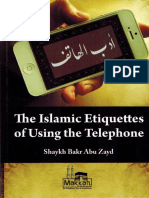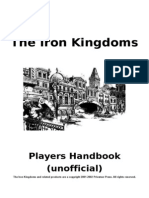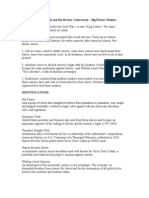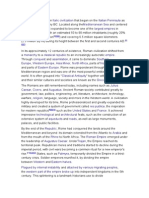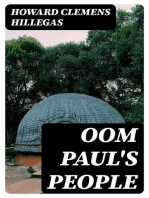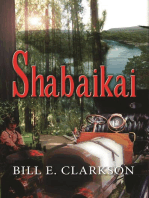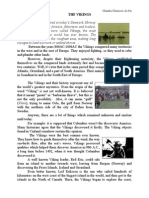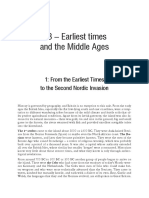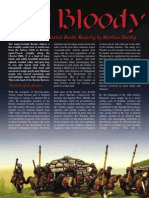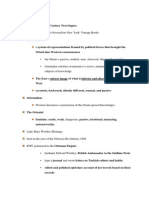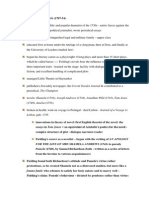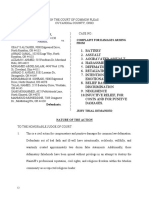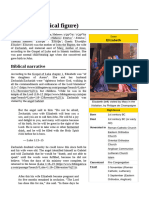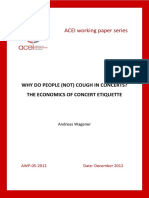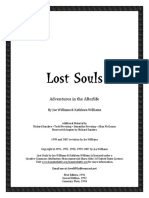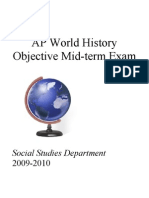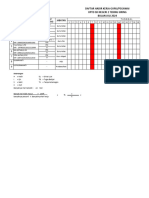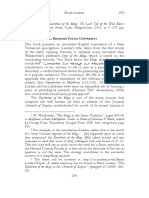Referat Celti
Referat Celti
Uploaded by
adrianabuda91Copyright:
Available Formats
Referat Celti
Referat Celti
Uploaded by
adrianabuda91Original Description:
Original Title
Copyright
Available Formats
Share this document
Did you find this document useful?
Is this content inappropriate?
Copyright:
Available Formats
Referat Celti
Referat Celti
Uploaded by
adrianabuda91Copyright:
Available Formats
The Celts The Celts From 500 BC to 795 AD the Celts were the exclusive tribe of the island.
The were not the first inhabitants. But when the arrived the assimitlated with the native !eo!le. "ost of the Celts were# tall and blond and the learned to wor$ with iron. the lived scattered on farms with hi%h walls around. There were no urban centres and the economic basis of societ was cattel rearin% and a%riculture. The Celts had no central !olitical or%anisation# but there were man bi% families# wich the called &clans'# scattered all over the island. (ometimes the &clans' consisted of u! to five %enerations# and all the farmhouses# cows# shee! and fields belon%ed the &clan'. )n the social life of the celts the &druid' was ver im!ortant# who had the !ur!ose of a !riest# fortuneteller and ma%ician. Another im!ortant !erson was the !oet or bard. As societ was non*literate# their function was to !ass on histor as well was to entertain. The +omans never came to )reland and so the celts could $ee! their own culture# but nevertheless the Celts and +omans artered. Durin% the fifth centur AD Christianit was interoduced# and with Christianit came ,atine culture and latine scri!t. -ow the bards were not that im!ortant an more# because the mon$s# .atricianus was one of the first mon$ in ireland /still (T. .atric$0s da 1# were able to write down )reland0s histor . 523455!d627%!9r At the time the most !owerful clan leaders wished to have more !ower and so eventuall the be%an to rule bi%%er areas. .oliticall # )reland was or%ani8ed into a number of $in%doms or tuatha# each of it was 5uite inde!endent under ist elected $in% /a more !owerful clanleader1.9rou!s of tuatha tended to combine# but the $in% who claimed overlordshi! in each %rou! had a !rimac of honour rather
than of 7uristiction. A division of the countr into five %rou!s of tuatha# $nown as the Five Fifsths occurred at the be%innin% of the Christian era.These were :lster# "eath# ,eister# "unster and Connau%ht. )n 795 AD the ;i$in%s invaded and severel reduced the !ower of the Celts. But Celtic lan%ua%e is still s!o$en in the west of )reland. The ;i$in%s !%345525627%%! At the end of the ei%hth centur broad shi!s reached the )rish coast# wich were able to resist wild storms. Those shi!s belon%ed to the ;i$in%s# (candanavian !eo!le from toda 0s -orwa and Denmar$. The sailed u!stream and invlicted devastation. The ;i$in%s !lundered and destro ed monasteries# and $illed all the mon$s and ever )rish !erson the saw. )n <42 AD the ;i$in%s con5uered two harbours# Ana%assan and Dublin# and chan%ed them into fortresses# because the had decided to sta on the island forever. The natives did not !ut u! tou%h resistance /the li$ed !eace and# as there was no bi% war before# the did not $now how to fi%ht =1. The climate was not as bad as in (candinaia# and the land was much more fertible than the %round at home. But in the lon% term the harbour in the north founded b the -orwe%ian ;i$in%s /Anna%assan1# could not survive# in contrast to the more southern >arbour# Dublin# founded b Danish ;i$in%s# wich ex!anded. 9raduall the !ower of the Danish %rew more and more inland. >owever# the also lost some of their warli$e character and be%an to associate and marr the Celtic inhabitants.
At the be%innin% of the 22th centur # man Celts became hostile to the ;i$in%s at Clontarf /near Dublin1# finall effected when (candinavian allies of the $in% of Dublin were defeated b >i%h $in% Brian Boru in 2024. The !ower of the ;i$in%s was bro$en. ?et there was no !eace. After Brian Boru died the local $in%s fou%ht each other for the !osition of hi%h $in%. The An%lo * -ormans B 2233# there was wides!read civil unrest. The $in% of ,eister / the bi%%est of the five ares1 +or @0Connor lost !ower and went to An%land to as$ for hel!. >enr )). / $in% of An%land1 was %lad to find a reason to interfere in )rish matters and so he allowed ,eincester0s $in% to enlist soldiers from Bales. )n 2270 a small but well e5ui!ed arm arrived let b (tron%bow /an An%lo*-orman adventurer1. >is modern wea!ons were far su!erior to an thin% the locals had so he easil overcame them. )n 2276 the island became a !art of Britain. B the Treat of Bindsor @0Connor# the hi%h $in% acce!ted >enr )). as his overlord and restricted his own st le to that of $in% of Connau%ht. The -ormans built bi% fortresses# wich the )rish !eo!le could not con5uer# because the had littel war ex!erience. But after a time the -ormans could not maintain their own culture# the conse5uence of wich was that -ormans !ic$ed u! their lan%ua%e# culture# custome and traditions of the natives. The were afraid the -ormans were &becomin% more )rish than the )rish themselves'. Britain was not ha!! to see that# and so !assed two lawsC overrolin% the )rish !arliament. * The -ormans were not allowed to s!ea$ )rish an more. * "ixed "arria%es were forbidden.
The $in% too$ this measure to sto! inte%ration# but there was onl limited success. At that time the im!ortance of the towns rose and there was a flourishin% trade between the -ormans and the )rish !eo!le. Adward ))). declared a law a%ainst that trade and a%ainst ever relation to the native !eo!le e.%. the -ormans had to $ee! their An%lish names. Durin% the firth half of the 25th centur )reland was# in effect# ruled b the three %reat earls# of Desmond# @rmonde and Dildare# who combined to dominate the Dublin %overment. )n 24<5 the >ouse of Tudor %ained !ower on the island. The Tudors >enr ;)). re!ieled the autonom of the )rish !arliament in 2494. -ow ever An%lish law was also in force in )relandC this resolution was called & .o nin%s Acts'. )t sub7ected the meetin%s and le%islative drafts of the )rish .arliament to control of the An%lish $in% and council. At the time of the +eformation >enr E))). bro$e all relations with the .o!e. >e forbade all monastic orders# includin% the )rish and confiscated their estates. The )rish !eo!le were inceuded because at that time the monasterie were ver im!ortant for records of )rish histor # culture and education. "arr Tudor sto!!ed this su!ression a few ears later# but she was afraid of the stron% Celtic traditions# and so# man An%lish men# mainl farmers settled in )reland to brin% )rish culture to an end.As a result resistance in )reland %rew a%ainst the An%lish. The )rish !olic of Alisabeth ). had the destinction of havin% reduced the countr to obience for the first time since the invasion of >enr )). Aconomicall # the towns and the countr side were exloited b the new administrators while the Fueen0s ex!enditure was increased.
"ost resistance came from :lster were the clan tradition was stron%est. Games ). continued Alisabethan !olic and as a result the exodus of )rih soldiers and churchmen to catholic countries on the continent was unabated.That made the )rish 5uestion an international one. >owever the realised the could not defeat the An%lish $in% Games ). and so the leaders flet to +ome. This fli%ht was called &The Fli%ht of the Aarls'. That conse5uence of that was that the $in% of An%land confiscated all the estates and setteled !rotestant farmers# commin% from An%land and (cotland. @liver Cromwell sto!!ed civil riots in An%land# but in 2342 civil riots also be%an in )reland. The Catholics# who fou%ht a%ainst the newl settled An%lishmen# were !ersecuted b the !rotestant.)n )reland there were far more Catholics than .rotestants# but the Catholics were not or%ani8ed and so the lost. )n 2549 @liver Cromwell wanted to sto! that civilwar in the wa he had done in An%land. >e came to the island and defeated all o!!osition. B 2356 all )rish resistance was over. >is methodes were hard. The )rish were forced into the west of the countr where the %round was !oorest. >is !hrase was &to hell or to Connau%ht'. After he left# he rewarded his soldiers b %ivin% them the best land. At that time man )rishmen emi%rated to America or in Auro!e or )ndia. A renewed cam!ai%n a%ainst Catholics and An%licans was not successful. Charles )). declared then com!lete reli%ious toleration.
.rotestantism existed mainl in the -orth# wich meant :lster. The new inhabitants# most of them (cots# were ver hard wor$in% !eo!le# who did not dama%e the econom # 5uite the reverseC now the econom in the -oth im!roved. This led to tension between the & Aconom * -orth' and the &Farmin%*(outh'. )n 23<9 there was a battle between the )rish# the Catholics# the An%lish and the .rotestants# wich toda is called the &Battle of Bo ne'. The catholic Ax*$in% Games )). lost the battle to his son*in* law# Billiam of @ran%e and flet to France. )rish Catholicism suffered ist most humilitatin% setbac$.That victor of the An%lish is celebrated ever ear. The .rotestants arran%e a !rocession thou%h the towns of northern )reland with oran%e fla%s and !ennatsH that0s often the cause of endless riots and feuds. Tension between -orth and (outh became worse because the farmin% industr in (outhern# and Central )reland was wea$ened b a law wich stated it# was forbidden to ex!ort wool exce!t to An%land. That means# that the An%lish could control the wool!rices and so )reland became more de!endent on An%land.
You might also like
- Doctrine of The Bible PowerPoint FULL TEXTDocument30 pagesDoctrine of The Bible PowerPoint FULL TEXTWilliams coloma astoria100% (2)
- Divina Bai C4 - Project 2 - Cultural ResearchDocument9 pagesDivina Bai C4 - Project 2 - Cultural ResearchAi QINo ratings yet
- Puritan AutobiographiesDocument5 pagesPuritan Autobiographiesadrianabuda91No ratings yet
- The Islamic Etiquettes of Using The Telephone PDFDocument33 pagesThe Islamic Etiquettes of Using The Telephone PDFMike JohnNo ratings yet
- Authentic Reading TestDocument199 pagesAuthentic Reading TestLê Trung Kiên100% (2)
- Unoffical Iron Kingdoms Players HandbookDocument23 pagesUnoffical Iron Kingdoms Players HandbookCody LeesNo ratings yet
- Nass Notes - History Module1Document42 pagesNass Notes - History Module1Joel Gwenere100% (12)
- A Royal Colony - ReaderDocument2 pagesA Royal Colony - Readerapi-234801058No ratings yet
- SS 11 - Unit 1-0 - Reading Guides - KeysDocument52 pagesSS 11 - Unit 1-0 - Reading Guides - Keyskase20No ratings yet
- Black WallstreetDocument3 pagesBlack WallstreetEddie Goynes Jr100% (4)
- Clanship and The Clans, Traditions of The Clans of Scotland (N.D.)Document136 pagesClanship and The Clans, Traditions of The Clans of Scotland (N.D.)jock100% (1)
- UntitledDocument3 pagesUntitledThirdy HummingtonNo ratings yet
- Old Charleston Originals: From Celebrities to ScoundrelsFrom EverandOld Charleston Originals: From Celebrities to ScoundrelsNo ratings yet
- Cnut's Takeover: ... Traitors Were Never Trusted But Collaboration PaidDocument7 pagesCnut's Takeover: ... Traitors Were Never Trusted But Collaboration PaidWildan Kholfa UmmatiNo ratings yet
- The Sequel of Appomattox: A Chronicle of the Reunion of the StatesFrom EverandThe Sequel of Appomattox: A Chronicle of the Reunion of the StatesNo ratings yet
- Chapter #16: The South and The Slavery Controversy - Big Picture ThemesDocument7 pagesChapter #16: The South and The Slavery Controversy - Big Picture Themesapi-238484074No ratings yet
- A Sketch of The Social Organization of The Nass River Indians - Edward SapirDocument38 pagesA Sketch of The Social Organization of The Nass River Indians - Edward SapirStevanija StevanovicNo ratings yet
- Fulani Empire of SokotoDocument260 pagesFulani Empire of Sokotouzbeg_khan100% (1)
- The White Slave Trade of The ArabsDocument3 pagesThe White Slave Trade of The ArabsRahim4411No ratings yet
- CH 16-17 ApushDocument8 pagesCH 16-17 Apushapi-236312482No ratings yet
- Cat Jumbled Paragraphs: 1999-2006Document11 pagesCat Jumbled Paragraphs: 1999-2006Muguntharajan SuburamanianNo ratings yet
- Ancient Rome Was An: Res PublicaDocument7 pagesAncient Rome Was An: Res Publicajuansinn2924No ratings yet
- History of The Celts in Music and Lyrics: Dominik ŻaczekDocument24 pagesHistory of The Celts in Music and Lyrics: Dominik ŻaczeksocksnifferNo ratings yet
- 02b FeudalismDocument3 pages02b FeudalismFrialynNo ratings yet
- His115 r3 Appendix A Clash of CulturesDocument3 pagesHis115 r3 Appendix A Clash of Culturesqtepiee888No ratings yet
- Il Pre RomanticismoDocument4 pagesIl Pre RomanticismoCecilia GarfiasNo ratings yet
- Scotland To AD 761 From The Birlinn Short History of ScotlandDocument36 pagesScotland To AD 761 From The Birlinn Short History of ScotlandМилан ВукадиновићNo ratings yet
- American Negro Slavery: A Survey of the Supply, Employment and Control of Negro Labor as Determined by the Plantation RegimeFrom EverandAmerican Negro Slavery: A Survey of the Supply, Employment and Control of Negro Labor as Determined by the Plantation RegimeNo ratings yet
- Orlando by GaslightDocument2 pagesOrlando by GaslightSteampunkObrimosNo ratings yet
- Important Events in ChaucerDocument2 pagesImportant Events in ChaucerTaibur Rahaman100% (2)
- Oom Paul's People: A Narrative of the British-Boer Troubles in South Africa, with a History of the Boers, the Country, and Its InstitutionsFrom EverandOom Paul's People: A Narrative of the British-Boer Troubles in South Africa, with a History of the Boers, the Country, and Its InstitutionsNo ratings yet
- Phys 8660Document4 pagesPhys 8660Nezer VergaraNo ratings yet
- Cagliostro: Master Magician of Fraud: by Jay Robert NashDocument6 pagesCagliostro: Master Magician of Fraud: by Jay Robert NashalmagusNo ratings yet
- A Brief History of English SocietyDocument8 pagesA Brief History of English SocietyNikki ParkerNo ratings yet
- Lays and Legends of the English Lake Country: With Copious NotesFrom EverandLays and Legends of the English Lake Country: With Copious NotesNo ratings yet
- 717 Shadows of EvilDocument94 pages717 Shadows of EvilIvan MoiseevNo ratings yet
- (Eric Christiansen) The Norsemen in The Viking Age (B-Ok - Xyz)Document26 pages(Eric Christiansen) The Norsemen in The Viking Age (B-Ok - Xyz)MarioMartinPaezNo ratings yet
- AP CH 3Document10 pagesAP CH 3aves3No ratings yet
- Earldom of Linth - PC PrimerDocument20 pagesEarldom of Linth - PC PrimerAlucix100% (1)
- Public Corporation Ulep NotesDocument81 pagesPublic Corporation Ulep NotesMC LENo ratings yet
- WWW - Referat.ro The VikingsDocument2 pagesWWW - Referat.ro The VikingsClimescu CarmenNo ratings yet
- GB - Earliest Times and The Middle AgesDocument9 pagesGB - Earliest Times and The Middle Ageshocini hocinidjNo ratings yet
- Dinka PeopleDocument3 pagesDinka Peopleaset999No ratings yet
- CH 18-19 ApushDocument13 pagesCH 18-19 Apushapi-238484074No ratings yet
- South Africa and the Transvaal War (Vol. 1-8): From the Foundation of Cape Colony and the Boer Ultimatum to the Conclusion of HostilitiesFrom EverandSouth Africa and the Transvaal War (Vol. 1-8): From the Foundation of Cape Colony and the Boer Ultimatum to the Conclusion of HostilitiesNo ratings yet
- Regents Packet 12 15 13Document31 pagesRegents Packet 12 15 13api-214573696No ratings yet
- MCNF 6Document21 pagesMCNF 6jcsolanasNo ratings yet
- Bloody Borders Part OneDocument7 pagesBloody Borders Part OneSlorm54100% (1)
- The Life and Opinions of Tristram Shandy, Gentleman: LAURENCE STERNE (1713-68)Document9 pagesThe Life and Opinions of Tristram Shandy, Gentleman: LAURENCE STERNE (1713-68)adrianabuda91No ratings yet
- A Portrait of The Artist As A Young ManDocument5 pagesA Portrait of The Artist As A Young Manadrianabuda91No ratings yet
- Montagu Orientalism and 18 - Century TraveloguesDocument2 pagesMontagu Orientalism and 18 - Century Traveloguesadrianabuda91No ratings yet
- Restoration Drama: TheatresDocument10 pagesRestoration Drama: Theatresadrianabuda91No ratings yet
- FieldingDocument9 pagesFieldingadrianabuda91No ratings yet
- Yasubedin Rastegar JooybariDocument3 pagesYasubedin Rastegar JooybariJahanzaib ShahNo ratings yet
- Portarlington Parish NewsletterDocument2 pagesPortarlington Parish NewsletterJohn HayesNo ratings yet
- The Church and GalileoDocument24 pagesThe Church and Galileoneocap100% (1)
- Do You Agree or Disagree With Gay MarriageDocument2 pagesDo You Agree or Disagree With Gay MarriageSopheaktra PhannNo ratings yet
- Dakwah Islam Multikultural Pada Komunitas Sunda, Arab Alawi Dan Arab IrsyadiDocument16 pagesDakwah Islam Multikultural Pada Komunitas Sunda, Arab Alawi Dan Arab IrsyadiSaifi AtoillahNo ratings yet
- Unmasking MonotheismDocument34 pagesUnmasking MonotheismRanson Oyadare Kennedy IIINo ratings yet
- The Portrait of A LadyDocument3 pagesThe Portrait of A Ladyshraddha2572sharmaNo ratings yet
- Compliant 2016 Icc-MembersDocument25 pagesCompliant 2016 Icc-MembersFouadNo ratings yet
- 200911Document69 pages200911sriNo ratings yet
- Examcentre 2023Document58 pagesExamcentre 2023abhijuuu89No ratings yet
- Elizabeth (Biblical Figure)Document5 pagesElizabeth (Biblical Figure)Anton Jayan JosephNo ratings yet
- Jesus Christ Biography: Synop SisDocument3 pagesJesus Christ Biography: Synop SisAiscene Rose MonleonNo ratings yet
- LPJ Sepak BolaDocument9 pagesLPJ Sepak BolaSMP QUEEN AL FALAHNo ratings yet
- A Biography of Hazrat Mir Momin Sahib Hyderabad IndiaDocument7 pagesA Biography of Hazrat Mir Momin Sahib Hyderabad IndiaMohammed Abdul Hafeez, B.Com., Hyderabad, IndiaNo ratings yet
- ADPS National Manual 2011Document46 pagesADPS National Manual 2011mafleeted7136No ratings yet
- 2011.01.16.a Needed, A Man To Fill The Gap - Elder Herb Hatfield - 117112235540Document16 pages2011.01.16.a Needed, A Man To Fill The Gap - Elder Herb Hatfield - 117112235540HARIMINONo ratings yet
- SACRED MOUNTAINS AND TALKING DRUMS The Tibetan Chöd Practice - Chinese Buddhist EncyclopediaDocument7 pagesSACRED MOUNTAINS AND TALKING DRUMS The Tibetan Chöd Practice - Chinese Buddhist EncyclopediaBenny BennyNo ratings yet
- Acei Working Paper Series: Why Do People (Not) Cough in Concerts? The Economics of Concert EtiquetteDocument31 pagesAcei Working Paper Series: Why Do People (Not) Cough in Concerts? The Economics of Concert EtiquettelidiamagarinoNo ratings yet
- Gri 33125013853623Document110 pagesGri 33125013853623Jonathan AlvesNo ratings yet
- Ancient India Gupta and Post-Gupta NCERTDocument3 pagesAncient India Gupta and Post-Gupta NCERTGauravNo ratings yet
- LostSouls PDFDocument245 pagesLostSouls PDFDave Baymiller100% (2)
- The Ancient Greek GodsDocument15 pagesThe Ancient Greek GodstainshNo ratings yet
- AP World History Midterm ExamDocument24 pagesAP World History Midterm ExamMsGutierrez71% (17)
- Absen Juli 2024Document19 pagesAbsen Juli 2024rahman_angsau4No ratings yet
- BACCHIOCCHI, Samuele - The Marriage CovenantDocument176 pagesBACCHIOCCHI, Samuele - The Marriage CovenantJohn Anthony Choquepuma Laccacta100% (1)
- Journey To Bethlehem. New York: Harperone, 2010. X + 157 PPDocument5 pagesJourney To Bethlehem. New York: Harperone, 2010. X + 157 PPAlessandro MazzucchelliNo ratings yet
- Contemporary Latin American Social and Political T... - (II - Liberation Theology Philosophy and Pedagogy)Document86 pagesContemporary Latin American Social and Political T... - (II - Liberation Theology Philosophy and Pedagogy)anon_691632717No ratings yet



